#lahore news live
Explore tagged Tumblr posts
Text
youtube
#arif lohar#arif lohar sons performance#arif lohar perfomence#arif lohar songs#new song arif lohar#live performance#beautiful video in mother and sons ma ki shan#arif lohar naat#awesome singing performance#performance#sakhawat naz best performance funny song#sakhawat naz best performance#sakhawat naz best performance new#punjab folk dance and song pakistan#sakhawat naz best performance qawwali#pakistan punjab folk song and dance#songs#arif lahore#punjabi#Youtube
0 notes
Text
Ten years ago, musician Usman Riaz grabbed a pencil and started to sketch.
He might have hoped, but didn't know at the time, that it would start him on a path to making history.
That initial drawing became The Glassworker - Pakistan's first ever hand-drawn animated feature film.
It follows the story of young Vincent and his father Tomas, who run a glass workshop, and a war that threatens to upend their lives.
Vincent's relationship with violinist Alliz, the daughter of a military colonel, begins to test the bond between father and son.
Usman tells BBC Asian Network the characters ultimately come to learn "that life is beautiful but fragile, like glass”.
He describes The Glassworker as an "anti-war film" set in an ambiguous and fantastical world that takes inspiration from his home country.
“I wanted to tackle issues and themes that would have been difficult to tackle if it was based in Pakistan," he says.
The country doesn't have the thriving film industry of neighbouring India and there is no government support or incentive for budding creatives like Usman.
So The Glassworker was a passion project, he says.
“These 10 years for me have just been purely driven with passion and obsession.
“Since I was a child, I have loved hand-drawn animation and there's something so magical about it.
"The beauty of the lines drawn and painted by the human hand always resonated with me.”
Usman says he travelled the world looking for mentors and his search took him to Japanese animation house Studio Ghibli.
The influence of the Oscar-winning artists behind classics such as Spirited Away and Princess Mononoke can be seen in The Glassworker's own style.
Usman says the industry veterans at Ghibli were also the ones who encouraged him to start the production himself.
After raising $116,000 through a 2016 crowdfunding campaign he founded his own studio, Mano Animations.
From there it's been a painstaking process, especially since full production started in 2019.
“What you are watching is essentially a moving painting,” says Usman.
“Every single frame you see, whether it's a background or the character moving, it's all drawn by hand.”
Usman says that, so far, he hasn't made any money from the project and has been unable to pay his wife Maryam and cousin Khizer, who he recruited to help him.
But there's hope that the labour of love could be the start of something bigger.
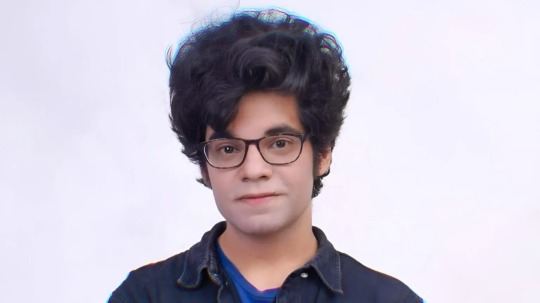
Usman Riaz says he's always been a fan of animation
Sharmeen Obaid Chinoy is another experienced industry figure Usman turned to for advice about getting The Glassworker off the ground.
She directed 3 Bahadur, a computer-generated tale that was Pakistan's first-ever animated feature film.
On its 2015 release it broke box office records, even surpassing US imports and dethroning previous record-holder Rio 2.
Her studio was also the country's first female-led animation studio, and she understands the challenges of getting started better than most.
“Everything in Pakistan is driven by passion” she says. “I had to run pillar to post.
“We're a country that has limited access to electricity and our industry is heavily taxed.
"We're unable to import computers and hardware needed for animation.”
But Sharmeen – who is going to direct upcoming Star Wars film New Jedi Order – says The Glassworker could be a “monumental step” for Pakistan’s animation scene.
If it finds commercial success, she believes it will “ignite” something in the country, but there are barriers to home-grown animation becoming a red-hot trend.
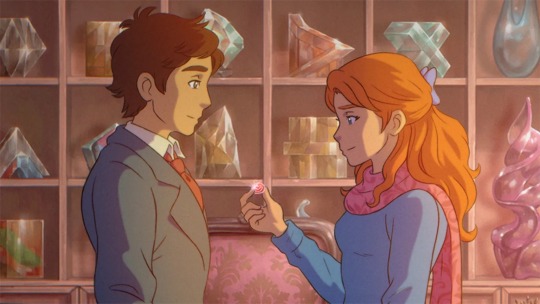
The Glassworker is partly about the romance between characters Vincent and Alliz
Arafat Mazhar from Lahore-based Puffball animation agrees that “the technical skills are already there” in Pakistan despite there being “no formal training or schools available”.
But “how do you not censor yourself?” he asks.
It's a question facing any Pakistani filmmaker who has to deal with its strict board of film censors.
“Every time there's a good film that comes out that's sincere, the state ends up censoring it,” says Arafat.
He doesn't believe the rules are likely to relax soon.
Akira Toriyama: Fans reflect on Dragon Ball creator's legacy
Stranger Things season five teaser excites fans
Is Hollywood finally doing anime right?
Sharmeen agrees the government will only encourage the domestic film industry to grow if they work to "provide opportunity to create a level playing field for us to compete with the rest of the world".
“There is a lot of scope in Pakistan for animation," she says. "We've just never been given the opportunity to create it."
She shares Arafat's pessimism about the pace of change.
"Unfortunately, it will just be a few filmmakers who have that passion, who will continue to create films," she says.
But Sharmeen says she is eager to see how the world embraces The Glassworker.
"I know that there is so much in there that will touch people's hearts," she says.
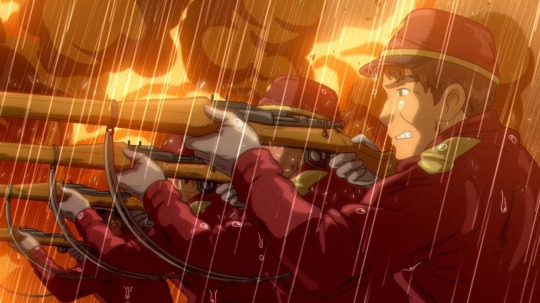
Usman says The Glassworker has an anti-war message
Usman will finally get to find out how audiences react to the work he's spent 10 years pouring his energy into as The Glassworker goes on general release.
He says he hopes to “put Pakistan on the map” and show it can stand up to the giants across the border in Bollywood.
But he admits the process has been “gruelling”.
“It is extremely difficult, but we've done something nobody has ever done in the country before," he says.
"I think we've created something special that can stand toe-to-toe with the rest of the animation produced in the world.”
Listen to Ankur Desai's show on BBC Asian Network live from 15:00-18:00 Monday to Thursday - or listen back here.
33 notes
·
View notes
Text
I'm obsessed with the parallels between Small Worlds and Children Of Earth.
For Jack specifically, CoE is the same events as Small Worlds played out on a much larger scale.
Something is happening with a child/children (Jasmine/the world's children). Turns out, it's an alien enemy Jack has seen before (Lahore 1909/Scotland 1965). It is established that the alien enemy is very very powerful and difficult to beat, and that they have made threats to the entire human race if their demands are not met. Both enemies demand children, and promise that the children they want will "live forever." A man is sacrificed as, essentially, a warning or an attempt to keep Torchwood away (Mark/Rupesh). Torchwood attempt to figure out different ways of beating the enemy. In retaliation, the enemy kills Jack's lover (Estelle/Ianto). The alien enemy also kills another person in its way (Roy/Clem) despite attempts to prevent the death. All this forces Jack to realize the extent of the threat and his grief also emotionally backs him into a corner. When he is faced with an ultimatum, he ends up painfully sacrificing a single child (Jasmine/Steven) for the good of the world, despite the pain it causes himself and the child's mother. He leaves feeling helpless, feeling like he had no other choice, with everyone angry at him and angry at himself as well.
I think what gets me the most about the parallels is the death of Jack's lover. It's obvious that Jack did and still does genuinely love Estelle. He says as much to Gwen. And he definitely feels guilt about her death; if he hadn't reunited with her, she would have been safe. I think his guilt and his feelings of responsibility towards both her and Jasmine and, ultimately, the world, are what cause him to sacrifice Jasmine to the faeries so readily instead of trying to negotiate or find another way. He's mourning the loss of Estelle and because of that grief I think he knows that he has to let Jasmine go. If he doesn't, more people will die, whether it's people he loves or strangers.
Similarly, Jack definitely feels guilty for Ianto's death, and I think there's guilt there that if Ianto hadn't come with him to Thames House he'd still be alive. In mourning the loss of Ianto, he's backed into a corner again, and he knows that no one else is going to sacrifice their own children to save the world. He sacrifices Steven despite the fact that it essentially destroys him completely, because he knows that if he doesn't, the whole world is at stake.
Every version of the parallel in Children of Earth is way, way more personal and in close proximity than in Small Worlds. In Small Worlds, everyone is a stranger, except Estelle. But while she was once Jack's lover, that's over 50 years in the past with all that time between them. After he sacrifices Jasmine, he's feels helpless, guilty, but she's a stranger and she wanted to go, in a way. He's blames himself but it's something he can bounce back from; he has distance. In Children of Earth, it is Jack's home and family that are destroyed or threatened, it is his current lover that is killed, and it is his own grandson that he has to sacrifice. All of those losses and sacrifices and guilts and everything totally break him, they're so close and personal and like he says to Gwen before he leaves, he has nothing left.
It establishes a certain kind of reaction in Jack. That when faced with a huge personal loss, if he finds himself trapped or in a difficult situation, he's willing to make a huge and often painful second sacrifice in order to protect the greater good, presumably because he's already in enough pain that this new loss seems like it can't make things that much worse (which ultimately ends up being untrue, but isn't necessarily the point), and because by showing emotional weakness, whatever he's up against can exploit him further by using that.
I wonder if the Torchwood writers noticed the parallels at all. The person who wrote Small Worlds was not involved in CoE at all. But it is interesting to have such similar storylines, yet one is played out on a much grander scale and with Jack made helpless in many different ways throughout the story rather than just at the end by the power of the alien itself.
53 notes
·
View notes
Text
Rangrez
Chapter 5: Police Police

"Huzoor, there is a police officer to meet you"
Phatto didn't raise her head to see, she didn't wish to meet Waheeda's fate. Mallika's eyes trailed to Zulfikar. Didn't they finally buried the case? Zulfikar sits up and nods at the younger woman, who makes her way to see the officer.
"We've got a phone call from Delhi, asking about Kainat. Do you want us to tell them the truth?"
Delhi? Mallika wasn't expecting Kainat to be there of all places. She thought hard about it. Kainat's nawab did come back, asking where she is. But Mallika was able to manipulate and send them back saying that the girl is theirs now, doesn't matter what she does. Kainat managed to escape from this hellhole, and as much as Mallika hated her, she didn't want Kainat to come back to Heeramandi. Also because Mallika didn't want Kainat to probe the Rehana's death scene. Mallika knew Fareedan and Kainat were close.
"No, she's happy where she is. She has no relations with Heeramandi whatsoever"
Waheeda stayed rooted to her spot, salty tears burning the newly made wound on her cheek. It should have been her.
_
"Police?" Akhtar was amused.
"You never know, what if she is only faking and using you?"
"You need to start believing people"
"Akhtar, do you really think I was going to trust just anyone?"
"She's just a young girl who escaped from her toxic family. What if they found she's here and will take her back?"
When the dinner was being served, Kainat saw Ram and Akhtar in a deep conversation, as of Ram broke their sacred knot. Not wanting to interrupt, Kainat waited until the dinner was served. As Ram and Akhtar made their way to the dining area, Kainat pulled Akhtar in a corner, showing a bracelet to him.
"What is this?"
Kainat places the yellow band, adorned with orange and red designs in Akhtar's palm. A doe eyes Akhtar showed plain confusion on his face. Kainat giggled, showing a matching band on her wrist too. "I got us matching bands as a token of appreciation. Akhtar bhaiya, if I wouldn't have met you that day, I'd probably be dead by now" Kainat's words melted Akhtar like ghee on flame. He cupped her cheek, taking the band from her.
A call from Ammi broke Akhtar and Kainat from their intimacy, hurrying them for dinner. Everyone sat down, passing and serving dishes.
"I am thinking of starting a dance class to earn money." Kainat announced, earning voices of appreciation. "Do you know how to dance?" It was only Ram, with a question hooked like fish on his tongue. "I do, in fact, my sisters has taught me ever since I was a child" Kainat amused. The same anxiety came back in her gut when thinking about Rehana.
"She's such a nice girl, so cultured and educated, such sincere. And you were calling Lahore, asking the polic-" a tight grip on Akhtar's bicep stopped him from saying further. A pin drop silence casted on familiar faces, staring at the young men. "Police?" Kainat's words fainted.
"Uh, well we had to confirm if-"
"I'm lying or not?" Kainat's tone was justified. "I wouldn't have mind if you did this weeks ago when we met, Mr. Ramaraju. But now? What's the point of it?" Ram sighed. "And you knew?" Kainat turned to Akhtar now. "I just got to know, I asked the same thing" Akhtar's voice faulted- whom to choose? His Anna or sister? Ram gave him a side eye for not defending him, but Akhtar wasn't entirely to blame. "We were just cautious since there are so many revolutionaries and-"
"Fine, go on. But Lahore? You called Lahore? What if my family finds out and comes back?" Akhtar's head whipped at Ram at super speed. Ram gaped and didn't say anything. Kainat didn't want to ruin everyone's dinner. She stood up from her seat, followed by Akhtar, who whispered a faint "I told you so". Before leaving, she turned around one last time, tears welling in her eyes. "Even if I was a delinquent, what if I wanted to change my whole life and that's why I came here? Would you have let me live with my new found family if you found I have an ill past?"
Ram stayed rooted on his seat, silent like soil. Meanwhile, Akhtar's parents exchanged looks. Police? Ram should have at least talked to someone first before doing this. Kainat stormed off that night, not eating her dinner.
The next morning, Ram visits the police station again, searching for his answer. He has seen various kind of criminals- stubborn, rude, kind and even innocent. And some manipulative. Ram believed Kainat was one of those, who has wrapped her amarbel around Akhtar's family so she could flourish. No matter how many emotional dramas she does, Ram was set to find the truth.
Ram stepped in the police station, making his way to the same constable. Upon seeing Ram's face, the constable pulled out a sheet of paper- that concluded the talk he had with Lahore police. Ram's eyes skimmed over the conversation, and for some reason, his face fell. Did he want her to have a bad past?
"They said that she has no criminal record, and is not related to Heeramandi either". Ram's eyebrows furrowed at the last statement. "Not related to Heeramandi?" He asked, giving the sheet back to the constable. The old constable nodded. "Heeramandi is a bazaar where tawaifs live, it's pretty well known. Seems like the woman you're after, she's a clean chit." Ram nodded, and left the police station. He has some mending to do.
Ram met Akhtar after leaving the police station. He told Akhtar about it, only to receive silent glares from him. "Go and apologize to her" Akhtar said, skipping a stone in the lake. "I didn't do anything wrong" Ram skipped another stone. It drowned on the second skip. "She didn't say it was wrong to do her background check. She said you didn't trust her for so long. And that you called Lahore" Akhtar skipped another stone. 5 skips. Ram held the flat stone in his hand, and looked up at Akhtar.
_____________________________________
Tagging: @ramayantika @vijayasena @jkdaddy01 @yehsahihai @lilliebeingdelulu @definitelyhim @starlight-1010 @panikk-attackkk @multifandom-boss-bitch @jeniniie
23 notes
·
View notes
Text
just when I thought western news bias couldn't get any worse.... here's a Guardian article covering different protests around the world for women's rights in honor of International Women's Day.
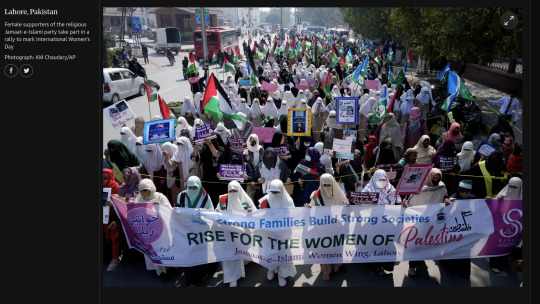
the above image is a protest that took place in Lahore, Pakistan. if you're only looking at the image, you'll find it pretty clear what the protest is for. like, c'mon, it's obvious. take a look at the caption though.
WHERE in the caption does it mention Palestine? Like, at all?
oh, but it gets better.
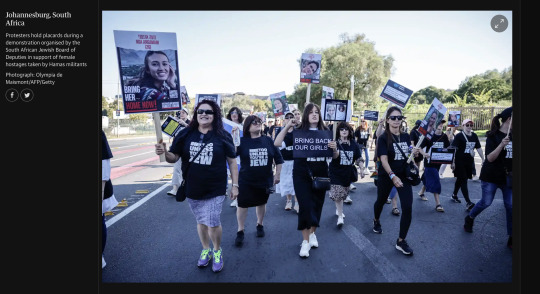
now THIS is a protest in Johannesburg, South Africa. right off the bat, you'll notice that this is a protest about bringing back israeli women hostages being held by hamas. but unlike the above protest in lahore, this protest gets a caption detailing EXACTLY what's going on. i'm not saying that these hostages shouldn't be returned to their families, but when women and girls in gaza are left to resort to tent scraps when they get their period, give birth in dirty classrooms, starve to death, leave their homes, live in conditions of utter INDIGNITY... it speaks volumes. our complacence and apathy speak volumes. and news articles like this speak volumes, too.
anyways, happy womens' day, everyone. let's fight for a world in which ALL women are treated with dignity, respect, and kindness.
#international women's day#gaza#ceasefire now#palestine#free palestine#from the river to the sea palestine will be free#gaza genocide#rafah#palestinian women#genocide#media bias#free gaza#also
25 notes
·
View notes
Text


To The Punjab Governor
Sir, With due respect we beg to bring to your kind notice the following:
That we were sentenced to death on 7th October 1930 by a British Court, L.C.C Tribunal, constituted under the Sp. Lahore Conspiracy Case Ordinance, promulgated by the H.E. The Viceroy, the Head of the British Government of India, and that the main charge against us was that of having waged war against H.M. King George, the King of England.
The above-mentioned finding of the Court pre-supposed two things:
Firstly, that there exists a state of war between the British Nation and the Indian Nation and, secondly, that we had actually participated in that war and were therefore war prisoners.
The second pre-supposition seems to be a little bit flattering, but nevertheless it is too tempting to resist the desire of acquiescing in it.
As regards the first, we are constrained to go into some detail. Apparently there seems to be no such war as the phrase indicates. Nevertheless, please allow us to accept the validity of the pre-supposition taking it at its face value. But in order to be correctly understood we must explain it further. Let us declare that the state of war does exist and shall exist so long as the Indian toiling masses and the natural resources are being exploited by a handful of parasites. They may be purely British Capitalist or mixed British and Indian or even purely Indian. They may be carrying on their insidious exploitation through mixed or even on purely Indian bureaucratic apparatus. All these things make no difference. No matter, if your Government tries and succeeds in winning over the leaders of the upper strata of the Indian Society through petty concessions and compromises and thereby cause a temporary demoralization in the main body of the forces. No matter, if once again the vanguard of the Indian movement, the Revolutionary Party, finds itself deserted in the thick of the war. No matter if the leaders to whom personally we are much indebted for the sympathy and feelings they expressed for us, but nevertheless we cannot overlook the fact that they did become so callous as to ignore and not to make a mention in the peace negotiation of even the homeless, friendless and penniless of female workers who are alleged to be belonging to the vanguard and whom the leaders consider to be enemies of their utopian non-violent cult which has already become a thing of the past; the heroines who had ungrudgingly sacrificed or offered for sacrifice their husbands, brothers, and all that were nearest and dearest to them, including themselves, whom your government has declared to be outlaws. No matter, it your agents stoop so low as to fabricate baseless calumnies against their spotless characters to damage their and their party’s reputation. The war shall continue.
It may assume different shapes at different times. It may become now open, now hidden, now purely agitational, now fierce life and death struggle. The choice of the course, whether bloody or comparatively peaceful, which it should adopt rests with you. Choose whichever you like. But that war shall be incessantly waged without taking into consideration the petty (illegible) and the meaningless ethical ideologies. It shall be waged ever with new vigour, greater audacity and unflinching determination till the Socialist Republic is established and the present social order is completely replaced by a new social order, based on social prosperity and thus every sort of exploitation is put an end to and the humanity is ushered into the era of genuine and permanent peace. In the very near future the final battle shall be fought and final settlement arrived at.
The days of capitalist and imperialist exploitation are numbered. The war neither began with us nor is it going to end with our lives. It is the inevitable consequence of the historic events and the existing environments. Our humble sacrifices shall be only a link in the chain that has very accurately been beautified by the unparalleled sacrifice of Mr. Das and most tragic but noblest sacrifice of Comrade Bhagawati Charan and the glorious death of our dear warrior Azad.
As to the question of our fates, please allow us to say that when you have decided to put us to death, you will certainly do it. You have got the power in your hands and the power is the greatest justification in this world. We know that the maxim “Might is right” serves as your guiding motto. The whole of our trial was just a proof of that. We wanted to point out that according to the verdict of your court we had waged war and were therefore war prisoners. And we claim to be treated as such, i.e., we claim to be shot dead instead of to be hanged. It rests with you to prove that you really meant what your court has said.
We request and hope that you will very kindly order the military department to send its detachment to perform our execution.
Yours
BHAGAT SINGH
#bhagat singh#india#desiblr#freedom fighters#desi#community building#practical anarchy#practical anarchism#anarchist society#practical#revolution#anarchism#daily posts#communism#anti capitalist#anti capitalism#late stage capitalism#organization#grassroots#grass roots#anarchists#libraries#leftism#social issues#economy#economics#climate change#climate crisis#climate#ecology
10 notes
·
View notes
Text
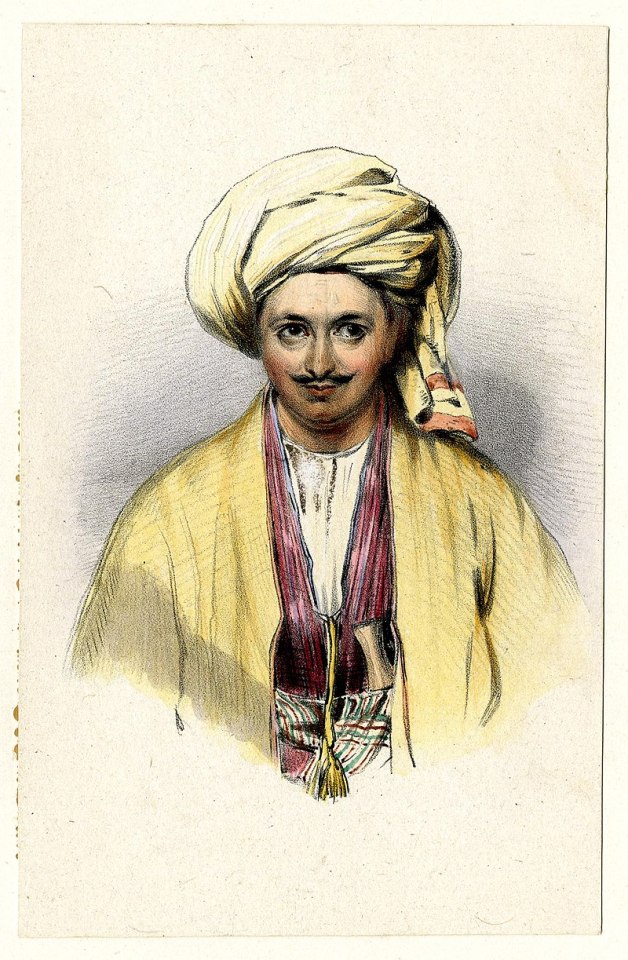

May 16th 1805 saw the birth of Scottish explorer, military officer, and diplomat Alexander Burnes.
Burnes was the poet Robert Burns cousin, note the spelling, Rabbies father, William also bore the name Burnes, Rabbie himself favoured dropping the “E”.
Now I don’t like delving into the history and politics of other countries, but this to me is a reminder that the problems in the middle east are long standing and interference in the region is long standing.
Alexander was the epitome of a nineteenth century adventurer cum dandy – dashing, intelligent and courageous.
In 1831, the British government in Delhi ordered a survey of the Indus River, unchartered since the time of Alexander the Great. The man they entrusted this mission to was Alexander Burnes. A journey of over 1,000 miles, Burnes, a natural linguist, charmed the usually antagonistic tribal leaders he came upon, and eventually reached Lahore, his reputation greatly enhanced.
His next adventure took him to Afghanistan, dressed as a native having discarded, in his words, ‘the useless paraphernalia of civilisation; we threw away all our European clothes" So he looked the part.
Burnes returned to England in 1833, where he was granted an audience with the king, William IV, and the Prime Minister. The daring young bachelor was the toast of London. His account of his adventures, Travels into Bokhara, being an Account of a Journey from India to Cabool, Tartary and Persia, sold a thousand copies on its first day of publication and made Burnes a tidy sum.
Meanwhile, the British government was making plans to dispose Dost Mohammed, the Afghan ruler, and replace him with Shah Shuja, an unpopular, former Amir, but one they considered had the advantage of being pro-British. Burnes had met Dost Mohammed in Cabool (sic) and liked him. He tried to persuade Lord Palmerston, Britain’s foreign secretary, that Shah Shuja, now living at Britain’s expense in India, was disliked by the Afghan people and lacked ‘sufficient energy’ and tact to rule Afghanistan effectively. But Palmerston dismissed Burnes’s concerns and gave the proposal his full backing. In late 1838, 10,000 British soldiers, 6,000 soldiers loyal to Shah Shuja, 38,000 camp followers and 30,000 camels marched into Afghanistan. Alongside them, the pretender to the throne and the disgruntled Scot.
As the convoy approached Kabul, Dost Mohammed fled. The British entered the city unopposed, placed Shah Shuja on the throne and congratulated themselves on a job well done. Having sent most of the army back to India, the remainder settled down to a life of indolence and luxury, living in a fortified compound just outside the city.
Alexander Burnes, now Sir Alexander Burnes, took up residence in Kabul and, despite his reservations about the new Amir, enjoyed life, indulging in a campaign of womanizing that infuriated the local men.
The Afghans’ growing resentment of Shah Shuja and Britain’s occupation finally erupted three years later. A crowd descended on Burnes’s residence, many of them husbands and fathers of Burnes’s numerous conquests. His servants urged him to leave but Burnes, in the words of his servant, was ‘quite sure the Afghans would never injure him’.
But they did. They set fire to Burnes’s house while the Scot shouted abuse at them. Finally realizing this was no idle protest, Burnes donned his turban and gown and tried to make his exit, accompanied by his brother. But both men were soon caught and, along with a number of servants, were hacked to death in a frenzied attack.
Two months later, the British garrison, having lost control of Kabul, attempted an evacuation to Jalalabad, ninety miles to the east. 16,000 British and Indian soldiers and camp followers embarked on the ‘Retreat from Kabul’. Only one Briton plus a handful of others survived the ordeal. The rest were all slaughtered by marauding Afghan tribes.
The tragedy was of Britain’s making but it caused profound shock in Victorian Britain.
If only they had listened to the dandy Scot in the turban.
The last pic is interesting, it is a drawing by our subject, of The Buddhas of Bamiyan, the one on the left was some 55 metres tall. Sadly, on orders from Taliban founder Mullah Omar, the statues were destroyed in March 2001, after the Taliban government declared that they were idols. International and local opinion strongly condemned the destruction of the Buddhas.
Read a report of his death on Craig Murrays web page here
9 notes
·
View notes
Photo
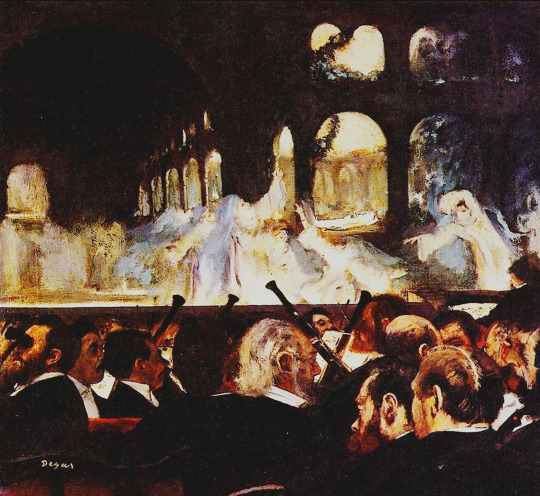
PARIS, 1882 - A Phantom of the Opera mix
“The Comte de Chagny was right; no gala performance ever equalled this one. All the great composers of the day had conducted their own works in turns. Faure and Krauss had sung; and, on that evening, Christine Daae had revealed her true self, for the first time, to the astonished and enthusiastic audience.”
Art: Edgar Degas - Robert le Diable (1876)
https://open.spotify.com/playlist/5zkPyUH5UZXkry9VgV3Kin?si=8de1a7f19f474c11
I. A French folk-song: Laisser-moi planter le mai (Rue Scribe, Paris)
II. Dukas: Polyeucte (The Ballet-girls in Sorelli’s room)
III. Delibes: Valse Lente (The Gala evening I.)
IV. Verdi: I vespri siciliani (The Gala evening II.)
V. Gounoud: Roméo et Juliette (La Daaé)
VI. Gounoud: Faust Act 5. The Prison Scene (The New Margarita)
VII. Gounoud: Funeral March of a Marionette (”Joseph Buquet is dead!”)
VIII. Massenet: Le Roi de Lahore (”He heard a man’s voice in the room")
IX. Halévy: La Juive (The Golden days of the Opera)
X. Saint-Saëns: Danse Macabre (A handful of letters written with red ink)
XI. Schubert: Lazare, La fête de la résurrection (Perros-Guirec)
XII. Bellini: Ah non credea mirarti (Christine, lost)
XIII. Khachaturian: Masquerade Suite - Waltz (The Masquerade)
XIV. Verdi: Otello (”Oh, horror! Horror! Horror!”)
XV. Mozart: Don Giovanni (”I am built up of death”)
XVI. Donizetti: La fille du regiment (A secret engagement)
XVII. Bach: Jesu, meine Freude (Christine vanished - Underground)
XVIII. Verdi: Don Carlo - O don fatale (The Scorpion or the Grasshooper?)
XIX. Monteverdi: Oblivion soave (A living bride)
XX. Verdi: Messa di Requiem - Lacrimosa (”Erik is dead.”)
#The Phantom of the Opera#poto#gaston leroux#le fantome de l'opera#music#just. LOVE LOVE LOVE the novel and wish we've seen more adaptations with a lot of opera in IT
83 notes
·
View notes
Text
Pakistani Steve Harrington
This is how I imagine Steve's parents.
And subsequently his grandparents.
Steve's mother is Maira (My-rah) Harrington
And his father is Arun (Ah-roon) Harrington
Though they both tell everyone their names are Maria and Aaron.
Both come from villages in Pakistan but if asked they both say they come from Lahore.
Both of their fathers are actually old friends.
Having both come to America on the same boat after the Partition.
Which for Pakistan is the 14th August 1947.
They were both two men coming to a new country, leaving their wives behind.
And both became close friends. As did their wives, Arun and Maira's mother's from helping each other in their husbands absences.
Though they both joke that they hated for years.
The two men both worked together in America on contracts for before coming back home when they ran out.
During that time families were grown.
Arun had an older brother and two younger sisters.
Maira had 2 younger brothers and a younger sister.
Arun was sent to America with his older brother to study. They lived with their uncle.
Though years later Arun's father made the journey bringing Arun's mother and his sisters.
Maira came soon after, Arun's father had found work for him and her father so he went back.
Though it was several months before he could send for his wife and kids.
Arun attended school, graduated and than went to work for his father.
Maira attended school but dropped out at 15.
Taking up a position as a seamstress to help support her family.
Arun and Maira were arranged to be married after Arun had graduated.
Being friends, their parents really wanted their kids to end up together.
Arun and Maira agreed, having known the other and wanting to please their parents.
Arun continued to work for his father and uncle and Maira quit her job.
In time Maira's mother went back home to care for her elderly parents.
And Arun's father went back to expand the buisness, going back and fourth from America and Pakistan.
Steve was born on the 4th July 1966.
He was named Steve because his parents feared that having an "abnormal" name would lead him to be ostracised.
Maira looked after Steve and they were both really close. She taught him their culture but also how to hide his heritage.
It started for his own safety but became you are in America, act like it.
She has lovely brown skin but would cover it up with fair and lovely products.
Showing her son how to apply it so he could be handsome and fair.
She taught him Urdu, English wasn't to be used in the home.
Although both his parents would get annoyed at how slow his English was coming along.
Arun was a distant figure, always working and held Steve to a high standard as his only child and son.
They do have fond memories but not many.
Maira stayed at home with Steve, doing charity work and such.
Until she found out Arun was cheating on her with his secretary.
And took to going with him on his trips.
Steve's grandmother, Arun's mother babysat him though this stopped when he turned 10.
As both of his parents thought him to be tall enough and old enough to look after himself.
Citing that they had looked after themselves when their parents had been working.
And Steve was too soft compared to them. Didn't know the value of hard work and was too coddled.
So this would fix that.
Basically both Steve's parents were bought up by parents who were proud of their heritage.
So were they but as time went on, businesses booming and such they both lost their connection to their roots.
That is why Steve was bought up knowing Urdu frequently as his first language.
And would happily talk to his grandparents in it.
While also taught that being fair skin and having a western name is a good thing.
As Steve grew into his own person he found himself and his heritage.
#Pakistani steve harrington#desi steve harrington#steve harringtons parents#steve harrington#Pakistani#Stranger things
39 notes
·
View notes
Text
dha lahore
A Comprehensive Guide to DHA Lahore
Lahore, the heart of Punjab, is known for its historical significance, vibrant culture, and modern real estate developments. Among the most prestigious areas in the city is the Defence Housing Authority (DHA) Lahore, which stands out as a symbol of luxury, security, and investment potential. Whether you're a local resident, a new homebuyer, or an investor, DHA Lahore offers opportunities that cater to all. Let’s dive into what makes DHA Lahore so special.
History of DHA Lahore
The inception of DHA Lahore dates back to the 1970s when it was initially conceived as a residential community primarily for retired military personnel. Over time, it evolved into one of the most sought-after residential and commercial areas for civilians and professionals alike. The involvement of the Pakistan Army in its development ensured that the housing authority upheld the highest standards of urban planning, infrastructure, and security.
Location and Accessibility
DHA Lahore is strategically located in the southern part of the city. Its proximity to Allama Iqbal International Airport, Ring Road, and major commercial hubs makes it an ideal place for those who desire both accessibility and exclusivity. Residents benefit from quick connections to Gulberg, Model Town, and downtown Lahore, allowing for seamless travel whether for work, shopping, or leisure.
Phases of DHA Lahore
DHA Lahore is divided into several phases, each with its own distinct characteristics.
Phase 1: The foundation of DHA, Phase 1, is one of the earliest and most well-established phases. It consists mainly of large residential plots and is characterized by mature infrastructure and green spaces.
Phase 2: With modern facilities and excellent urban planning, Phase 2 is known for its high-end properties and well-maintained public spaces.
Phase 3-7: These phases represent the gradual expansion of DHA and offer a mix of residential and commercial opportunities. Many areas in these phases are fully developed and have become desirable locations for new residents.
Phase 8-9: Considered the "new DHA," these phases offer state-of-the-art infrastructure, contemporary designs, and cutting-edge facilities. As development continues, these phases are fast becoming hotspots for new investments.
Master Planning and Infrastructure
DHA Lahore’s meticulous master planning ensures that all phases benefit from wide roads, extensive green belts, and underground utilities. The housing society takes pride in maintaining parks, recreational areas, and strict zoning laws to prevent overcrowding and maintain a serene environment.
Real Estate Market in DHA Lahore
When it comes to real estate, DHA Lahore is a goldmine for buyers and investors. Whether you are interested in residential properties such as villas, apartments, or plots, DHA offers a range of options to suit different preferences and budgets. The plot sizes typically range from 5 Marla to 2 Kanal, allowing buyers to choose according to their needs. Prices vary significantly depending on the phase and property size.
For those looking at commercial properties, DHA has ample opportunities for businesses with its well-planned commercial areas, ensuring a steady flow of customers and high returns on investment.
Lifestyle and Community Living
Living in DHA Lahore means more than just owning property. It’s about being part of a community that values quality of life. Residents enjoy well-maintained parks, community clubs, and sports facilities, such as DHA Sports Complexes, offering everything from tennis courts to swimming pools.
Educational Institutions in DHA Lahore
DHA is home to some of the most prestigious educational institutions in Lahore. Renowned schools like Lahore Grammar School and Beaconhouse School System have campuses spread across various phases, ensuring that children receive top-notch education within a short commute.
Healthcare Facilities in DHA Lahore
Access to medical services is another major perk for DHA residents. From general hospitals to specialized clinics, such as National Hospital, residents have access to excellent healthcare facilities that ensure their well-being.
Shopping, Dining, and Entertainment
When it comes to leisure and shopping, DHA Lahore doesn’t disappoint. Popular shopping destinations like Y Block Commercial Area and Packages Mall offer everything from high-end fashion to daily essentials. Dining options are abundant, with a variety of cafes, restaurants, and fast food outlets catering to different tastes.
Security and Safety
One of the biggest draws of DHA Lahore is its unmatched security. The entire area is gated, with 24/7 surveillance and patrols. DHA security works in tandem with local police to ensure a safe living environment, making it an ideal choice for families.
Environmental Initiatives
DHA Lahore is known for its commitment to sustainability. The community engages in several green initiatives, such as tree plantation campaigns and the development of green belts, ensuring that it remains a healthy and eco-friendly place to live.
Investment Opportunities in DHA Lahore
Investors have long been drawn to DHA Lahore because of its reputation for offering solid returns. As property values continue to rise, investing in DHA remains a smart choice for those looking to grow their wealth. From renting out properties to long-term sales, DHA offers plenty of opportunities for both small and large investors.
Challenges Faced by DHA Lahore
Like any rapidly growing area, DHA Lahore does face some challenges, such as traffic congestion in certain phases due to the growing population. However, the development of new roads and connections to the Lahore Ring Road is helping to alleviate these issues.
Future of DHA Lahore
Looking ahead, DHA Lahore has ambitious expansion plans. New phases are in the pipeline, and there is a strong focus on introducing more advanced infrastructure and green initiatives. The future of DHA Lahore looks promising, with ongoing projects ensuring it remains a top-tier housing society for years to come.
Conclusion
DHA Lahore has established itself as a premium residential and commercial area that combines luxury, security, and modern living. Its prime location, coupled with world-class infrastructure and a vibrant community, makes it an ideal choice for anyone looking to invest or settle in Lahore. As it continues to expand and evolve, DHA Lahore will remain a benchmark for urban living in Pakistan.
FAQs
What is the starting price of a house in DHA Lahore?
Prices for a house in DHA Lahore can start from PKR 2-3 crore for smaller properties and go up depending on the size and location.
How secure is DHA Lahore for families?
DHA Lahore is known for its top-notch security, with 24/7 surveillance, gated communities, and dedicated security teams ensuring a safe environment for families.
What is the difference between various phases of DHA Lahore?
Each phase in DHA varies in terms of development, pricing, and infrastructure, with newer phases offering more modern amenities while older phases provide a more established community.

2 notes
·
View notes
Text
OMAN AMARI KHURSHID

Origin: asalee
Status: organic
Nationality/Ethnicity: Pakistani, currently resides in northern Britain
Age: 57 (date of birth August 31st, 1985) (pictured above at roughly 30-40 years old)
Occupation: electrical engineer, lineman
About:
Oman Khurshid is the son of Yushfa Saeed. His father left when he was very young and he was raised solely by his mother. His daughter is Samya Amari.
Oman happily lives in seclusion in the northern British countryside. He works as a local home electrician, though in his younger (and more agile) days he was a lineman. Even now as he continues to age, his occupation keeps him physically fit, as well as experienced with a range of tools. He is a strict pacifist, but still keeps a rifle by his bedside.
Oman is highly avoidant, and thus lives as a hermit. He is soft-spoken and not one to make himself the center of attention. Despite this, he has a strong moral code and will do anything to protect the people he cares about or what he believes in. This often makes him paranoid and untrusting of others he doesn't know. To those who are close to him, he is very sweet and loves to dote on them, though he isn't best at verbally expressing this affection in words. Oman likes taking apart and rebuilding electronics, freshly brewed tea, the smell of jasmine, and frozen TV dinners.
Background:
Born as Mehwish bint Khurshid, Oman experienced a typical childhood in Lahore. He has fleeting memories of his father, but he was very young when he left his and his mother's lives, which still bothers him into adulthood. In his mid-late teens, he came to realize he was a trans man and chose his new name. He remained closeted into his late 20s out of fear of angering his mother, especially once she fell ill in 2008.
When her health began to rapidly decline, along with a diagnosis of aggressive brain cancer, Oman decided to move to Britain for work in hopes of getting her lifesaving treatment. The Mallory lab takes him in as an equipment technician in their neurology research department, and in return promises to care for his mother. Unbeknownst to him, they actually plan to use Yushfa to harvest EBID.
While working as a technician, he meets Mia Safarova. Despite being shy, and struggling with spoken English, he's able to communicate with her more easily than anyone else they work with. They form a fast friendship, and Mia is the first person to call him by his chosen name, though he swears he never told her what it was. She's very curious about his life and comes off as strangely naïve. He forms a bit of a one-sided crush on her.
The EBID experiments on Yushfa prove too rigorous for her failing health, and she dies before a sample can be taken from her. Oman is not told this. Instead, Cassandra Mallory asks him if he would like to undergo the same procedure, no questions asked. She promises to give him the equivalent of $500,000, and still believing his mother is alive, he agrees. Mia tries to talk him out of it, knowing the truth, but this upsets him. They have a rough falling out.
On the day of the surgery, he realizes Mia will be the one performing it. With Cassandra attending, Oman is given a craniotomy just above his left eyebrow that extends to behind his ear. A fragment of brain matter from his frontal cortex is removed. Once he successfully recovers the next day, he's sent on his way.
Upon returning to Yushfa's home, he finds someone else living there. He tries contacting the Mallory lab to no avail. They claim they never had her in their custody. When he reports this to the police, they don't take him seriously and a missing persons report is never filed. In the coming months, he begins experiencing terrible side effects from his surgery, including gaps in his memory, hallucinations, and a piercing headache. This causes him to enter a manic state, doing anything and everything to find out what the Mallorys did to his mother and to him.
Oman believes all this to be in his head until he realizes the hallucinations he sees and hears coincide with electrical disturbances around him, most notably in disrupting the movement of his watch. He jerry-rigs a homing device to track the source, and realizes it's coming from the same lab he worked at. At the peak of his mania, he climbs a utility pole to break into the lab complex, where he finds Mia and infant Samya. She reveals that Samya is his daughter and the cause of his hallucinations, but he doesn't understand how that can be true. Cassandra hears the commotion and shoots him, but misses his heart.
Oman escapes with Samya, but passes out from blood loss. Mia follows him, setting fire to the lab and driving them to the countryside. She performs surgery to save his life and gives him a transfusion of her own blood. There she establishes a new life for the three of them while he recovers. To help them avoid capture, she gives Oman the avenues to finally present as a man and begin his medical transition, which helps keep the Mallorys at bay since they're still looking for "Mehwish." He changes his last name to Amari, the name of his mother's grandmother, both to leave his father's memory behind and keep is identity hidden.
He and Samya live a quiet life in the countryside. In their 40s, he and Mia enter an on-again-off-again relationship. He often helps her in combatting the Mallorys until her disappearance in 2029.
#mine#ouro#character#again just cliff notes IM NOT WRITING SLL THAT SHIT AGAIN ‼️‼️💥#say hi to the sexiest man on earth right NEEOWWW#oman
18 notes
·
View notes
Text
Favourite first watches
I was tagged by @silenthillmutual to list my favorite first watches of june - which was a no-brainer for me! If you follow me on Letterboxd you might have noticed that I went a bit crazy watching new movies every other week this year. In June alone I watched 7 new movies and finished/started 2 new shows. So without further ado here are my faves:




(one of these is not like the others lmao - I'll give you a hint: it's the only one that's a predominantly white Anglo production 😂)
Joyland (2022) dir. Saim Sadiq
A mesmerising look into the lives of 3 disenchanted people living under the patriarchy of Lahore, Pakistan. It was banned in the province of Punjab, where the story takes place, so you know it definitely hit a nerve. Bonus points for the trans character actually being played by a trans actress. Can't recommend this enough!
Monkey Man (2024) dir. Dev Patel
I saw it opening night in Hong Kong with a homie. The action sequences are its high points but it surprised me in its approach to portraying gender and community too. I shan't say more and spoil it too much!
Derry Girls (2018 - 2022)
1×01 is hands down the best comedy pilot I've ever seen. I fell in love with this show at first watch.
Masters of the Air (2024)
I've got 1 episode left to go but it definitely holds up. The emotional story beats hit and well...it helps that the cast is very easy on the eyes 😁
This was fun! I'm gonna tag @aquilathefighter @fromjannah @thenaphorism @frostedjustice @artemisa97 and all other mutuals who wanna take a stab at this :)
3 notes
·
View notes
Note
I initially didn't think of typing out this ask, (mainly because this is a side order countdown account) but upon seeing the many pro Palestine and Palestinian awareness posts on here I decided to give 2 cents on this. I Come from India and in 1947, nearly 200 years of British rule came to an end and India was given independence. Yet, this would not be a time for celebration. Upon independence the British decided to partition the colony into 2 different countries based on religious lines, creating a Muslim pakistan and Hindu India. The new border between the countries was only revealed to the public after independence day and over 16,000,000 people were told leave the place where their ancestors had lived for centuries and cross the border to a separate country simply because of their religion. Over 15,000,000 were displaced from the partition and another 1,000,000 were murdered in cold blood and over 75,000 were raped by religious mobs who took advantage of the chaos and caused mass riots across india and pakistan. It wasn't long before the militaries of both countries stepped in and a massive undeclared war broke out in the north, killing even more people and hightening religious tensions and hatred. My grand uncle was in lahore for a buisness trip when the partition happened and my great grandmother recieved a telegraph saying that he had gone missing, 2 weeks later he was found, but he was never the same person. He never really talked about what he saw and died just a few years later. Even today, In modern day India, the repercussions of what happened in 1947 are still felt today and now with elections coming up and the increasing likelihood of the Hindu extremist government being reelected again I fear for my Muslim friends more then ever. What's happening in Gaza horrifies me in a way I can't really explain. A constant fear that has been plaguing me ever since October was that the same thing might happen here in India. Sorry if there are any typos in this, I'm literally shaking as I write this. My heart goes out to all the innocent people being bombed by Israel and I hope that a ceasefire will be signed and I hope that no people will ever have to go through what the innocent people of Palestine are going through and have been going through for the past 76 years. You don't need to respond to this if you don't want to, I just wanted to at least somewhat express my Outlook on the genocide and it's chilling resemblance to the religious holocaust that occurred in my homeland. Palestine Zindabad.
I'm so sorry for all that you've experienced, Anon.. Mourn for the dead, fight like hell for the living. 🇮🇳❤️🇵🇸
4 notes
·
View notes
Text
A dive into the archives
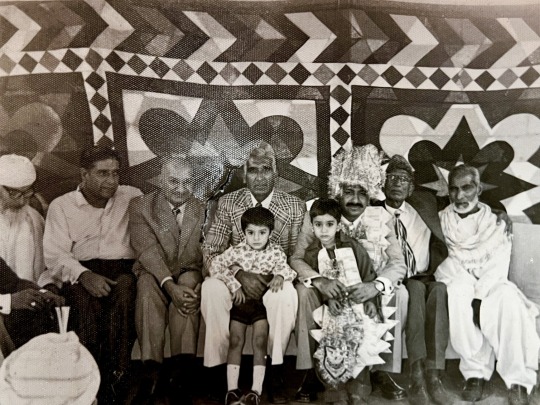
Image 1: My maternal family at a wedding Dawat in post-partition Lahore, Pakistan (1977) The groom, who happens to be my Mamoo (maternal uncle) is adorned with shiny headwear and garlands sewn with cash notes. The colourful, patterned shamiana tent veiling the Dawat is a common occurrence in banquet halls even today. Dawats also serve as the ideal opportunity to get multiple family members and kin together for a group portrait, a crucial and vital method of documenting a visual record of humans that are often overlooked and erased from history and whose lived experiences have been minimized and rendered invisible by colonial hegemonies.
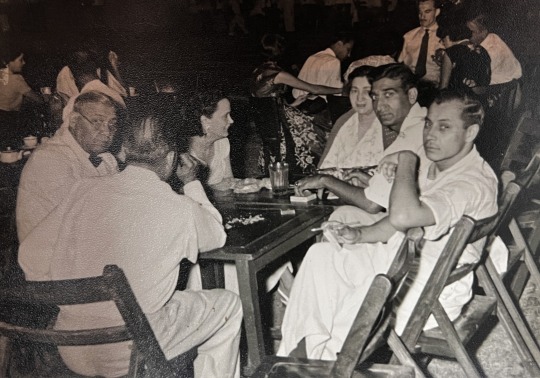
Image 2: My maternal grandfather, F.D Chaudhry, a soldier in the British Army, hosting his British and German friends at a small Dawat in post-partition Lahore, Pakistan (1950) These are foreign families that chose to remain in Pakistan after the partition of the country from India, but have since returned to their respective homelands.
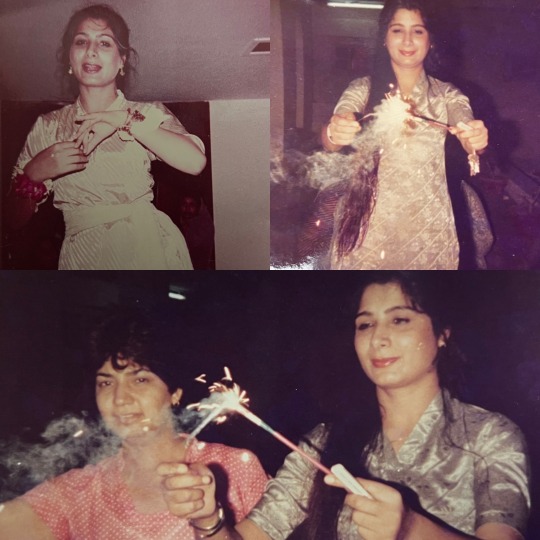
Image 3: My mother, Mohtarma Rubina Magsi, celebrating Shab-e-Barat, a major Dawat for the global Muslim community, honoured in the month of Sha'ban in the Islamic calendar (1980s) After finishing our prayers in new clothes, we would head outside into the garden to play with sparklers and light little diyas (oil lamps made from clay) all around the boundary walls of our home. The deceased are honoured on this day and the festival is celebrated in unique ways in Muslim countries around the world, depending on the country and culture.
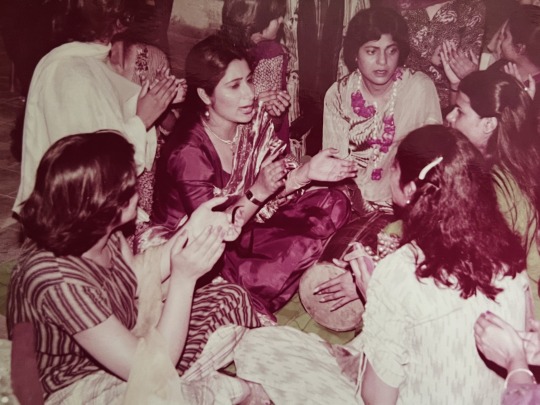
Image 4: Mohtarma Rubina Magsi surrounded by her singing and clapping women friends ( Late 1970s) They are taking turns playing the dhol (drum). Often a sturdy, silver spoon is also hit onto the center of the dhol to add depth to the music. Some guests may even reach for a dufflee (tambourine) and clap it against their henna stained palms. The music can range from orally transmitted folk songs to Bollywood hits from across the border. Healthy competition is fostered as guests attempt to outdo one another with an impressively long array of memorized songs.
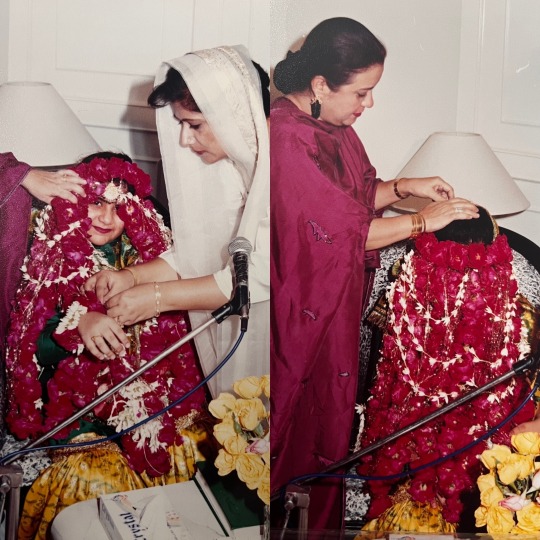
Image 5: A duo collage of community elders veiling my hair and face with heavy garlands of vibrant, red rose flowers to mark the Rasm-e-Ameen, a Dawat hosted to honour the completion of formal Quranic education. The customary prayers are followed by a large buffet style banquet feast. (1993)
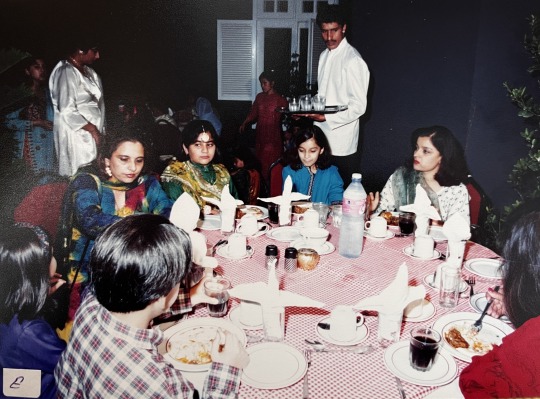
Image 6: Guests enjoying their banquet dinner on a round table after the Rasm-e-Ameen. A waiter holding a tray with glasses watches over the banquet tables to ensure the guests are looked after. (1993)
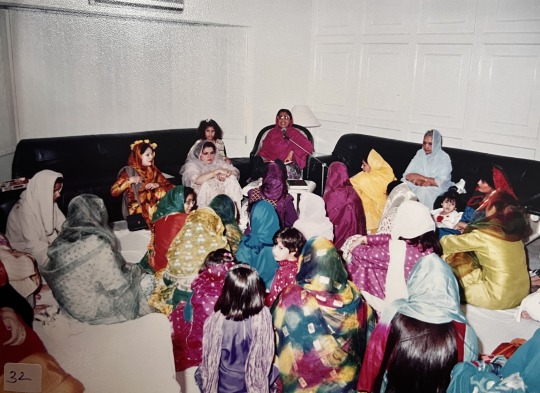
Image 7: A women prioritized Dawat-e-Milad in praise of Prophet Muhammad, hosted at our home in Karachi, Pakistan. Though veiling of the hair is not an imposition in Pakistan, even at women prioritized religious, cultural and spiritual events such as these, both Muslims and non-Muslims loosely cover their hair momentarily, out of respect. (1995)
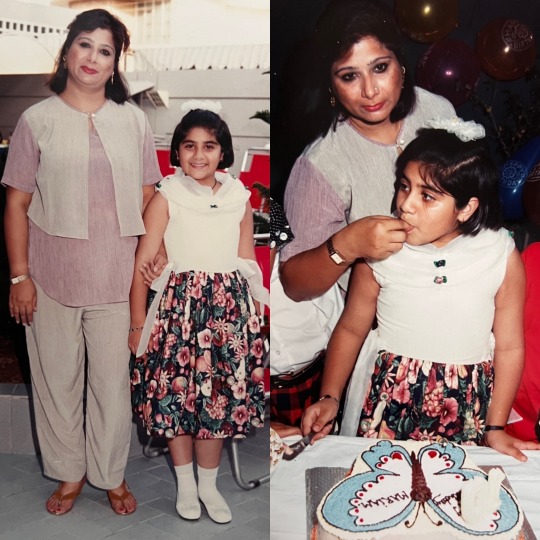
Image 8: A birthday banquet to honour the day I was born. It is interesting to note, that while traditional, cultural garments are prioritized for certain events, like the Dawat-e-Milad, Rasm-e-Ameen or a wedding Dawat, western clothing, games and food is often engaged at Dawats such as birthdays and graduations. (1994)
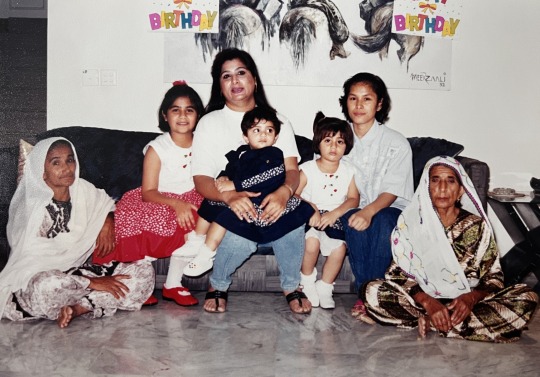
Image 9: Generation after generation, the visibility of women in documentations of family life has increased. This is a family photograph taken on my birthday Dawat (1993) with my mother at the center, surrounded by children, and caregivers from the Philippines and our ancestral lands, Jhal Magsi, Balochistan. I was truly raised by a multi-generational, diverse village of people from all corners of the world. While some members of our family are wearing western clothing, others are dressed in traditional, cultural garments and have chosen to veil their hair.
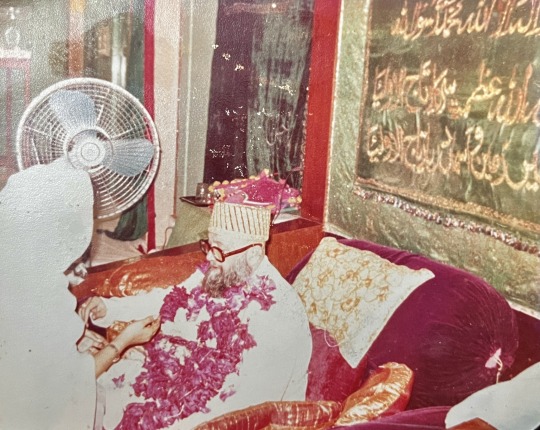
Image 9: A spiritual, Sufi Dawat at the Taji Shrine in Meva Shah, Karachi. My mother is adorning our family's Sufi saint (Baba Anwar Shah Taji) with heavy garlands of red roses. (1980) While flowers are given feminine traits in various cultures around the world, in many South and Central Asian countries, such as India, Pakistan and Nepal, flowers are a gender neutral way of showing love and adoration through the art of ornamentation. After the customary Sufi rituals are complete, the congregation gathers side by side on the floor to consumer Langar, a meal that is served to everyone in attendance, at no cost. The Langar menu can vary from week to week, consisting of curries, rice dishes, naans and sweets, and no one is turned away from the doors of the shrines when Langar is served. Whether cis or trans, male or female, able or disabled, rich or poor, local or foreign, everyone is welcome here. In some shrines the genders are segregated.
Most Dawats in Pakistan mark important life milestones, like births, birthdays, weddings, graduations and are also influenced by cultural traditions and religious rituals, varying from household to household, depending on cast, clan, socioeconomic standing, province and religion.
There are some motifs and symbols that make a recurring appearance, era after era, such as rose petals and night blooming jasmine flowers, shamiana tents, cauldrons of Biryani, unisex garlands and head coverings made with either cash or flowers (or both), various forms of veiling (with both textiles and flowers), the dhol (drum) and of course, endless cups of Chai. Of the various significant Dawats that take place throughout the year, apart from events like birthdays and weddings, certain religious Dawats like Shab-e-Baraat (a major festival for Muslims celebrated in the month of Sha'ban, the eighth month of the Islamic calendar) Rasm-e-Ameen (formal completion of Quranic education), Urs (death anniversaries of Saints and Mystics), Milad (events fostered in praise of Prophet Muhammad) and Niyaz (Meditative chanting and prayers followed by distribution of food amongst the needy) also encompass specific rituals and customs. As visible in the archives, there was also a healthy mix of retaining local, familial customs and traditions, while also engaging with clothing, games, food and rituals from cultures outside of Pakistan.
For example, every New Year’s Eve, it was customary in our home to consume a large feast of purely Filipino food, made by our caregiver, Flordeliza Sauza. Right as the clock would strike midnight, you best believe, we would be shoving Siopao, Pansit and Chicken Adobo with garlic rice into our excited, hungry mouths. Similarly, Chinese food was also a staple, especially at birthday parties and weddings. My wedding Dawat feast in Karachi included several desi Kababs, Curries and Puloas originally devised in the royal kitchens of India, but many Chinese dishes were also served, such as Chicken Manchurian, Beef Chilli, Shrimp Dumplings and Vegetable Fried Rice. This is reflective of a society that is open to global influences.
Women have been at the forefront of cultural continuity in Pakistan, as well as in the diaspora. Religiously inclined Dawats, such as the Milad and the Rasm-e-Ameen often take place in women prioritized spaces, with multi-generational guests in attendance, fostering community and togetherness. One of my favourite moments from the Milad Dawat has to do with guests being showered with delicate, soft sprinkles of rose water, while standing side by side, singing and praying in a unique moment of women's solidarity. In some Milad Dawats, guests are not only showered with droplets of Rose Water, they are also covered with petals from red roses, making the experience truly immersive and embodied.
2 notes
·
View notes
Text
Rangrez
Chapter 2: From Lahore

It was just another morning in Delhi. The sun started to rise and Ram was back home, sweating like a melting snow cone. He got ready to report to the police station- when he remembered he had a duty at the railway station today.
Ram didn't understand why the authorities would give him duty at most peculiar places. It was only a comfort that the railway station was close to police barracks. But he understood that crowd and riots like this can only be handled by him. It was 7 am, and the train from Lahore has just stopped on the railway station of Delhi. Chandni chowk was a bustling market, and often the crowd made its place on the railway station. Even 7 am looked like a Sunday evening sometimes. Buying a cutting chai, he sat down on the stool, observing everyone in sight.
A sweet sound pulled Ram's attention- sounds of payal not usually heard around here. His neck whipped to the sound, to see a woman dressed like a bride from head to toe. Was she a runaway? Ram looked away, continuing on his tea and biscuit. Delhi is a sight of all the freaks and couldn't care less. Ram finished his tea and got up to pay, when a hand extended in front of him to pick a toast. He couldn't help but see the fading green lines on his wrist, as if a tattoo hardly recognizable. When Ram saw the man's face, the instant anxiety kicked an intuition in Ram- he knew who the man was. Ram soon sprinted after him, as he escaped, running to catch the member of a decoy gang who looted a whole family of the superintendent. The decoy put up a good fight, injuring Ram at places but in 10 minutes, Ram had the decoy in his hands.
On the other hand, Akhtar entered the frame of Railway station, eyes seeking for Ram. He parked his motorcycle, swinging the bag of lunch as he got off the bullet. Ammi made biryani and he had to deliver the fresh and hot delicacy. With a small smile, he made his way inside. Akhtar's first stop was the officer's room reserved for the police, but he had no luck there. Where would Ram be on such a big platform?
Upon looking further, he saw a woman, dressed like a bride from head to toe, sitting on one of the benches. Her face screamed she needed help, and she looked out of ordinary. It was almost time that she started attracting chain snatchers and ill intenders. Akhtar moved close to her, cautiously, and luckily gained her attention without calling for her.
"I am sorry to disturb but are you in trouble?"
The woman looked at him up and down, and then looked away. Akhtar gulped, but understood her ignorance. "I don't mean to do any harm, I'm just here to drop my friend's lunch. I thought you needed help." Akhtar tried, he thought. When she didn't budge from her position, he started to walk away, unsure. "Listen!" A melodious voice pulled him back, and he turned to her immediately. "I hope what you're saying is true. I am new to this city and I need a place to stay for some time." Akhtar smiled proudly "Where are you from?" "I am from Lahore, my name is Kainat"
Akhtar's eyes physically shined upon her name. "What a beautiful name, my younger sister would adore you" Kainat's eyes glistened at that. A sister who adores. "Would you know any place for me to stay temporarily?" Kainat repeated her query and Akhtar nodded, fortunately. "You can live with my family for sometime, I'm sure they won't mind" Her smile reached her eyes, nodding quickly. "Let me just find Ram Anna and introduce you to him, till then you can sit and wait in here".
Akhtar guided Kainat to the waiting room outside the police officer's room. After all, this was the safest place for her and easiest to find. She tapped her foot repetitively, anxious if she was deceived. She couldn't even get his name- all she knows is that he is looking for his friend, Ram.
About 2 minutes later, Kainat saw a man getting dragged inside the station by his collar. Must be a pick pocket, she thought, clutching her bag closer. There are a lot of them in Delhi. Kainat's attention was not on the police station, that was the last of her interest. She never understood how the people of nation could stand up against the freedom of their own family, their own blood. Whites to be damned, her blood boils whenever she witnesses a brown police officer. That was one of the things she hated about nawabs- taking the oppressor's side for their own luxury and comfort. She loved dancing, as long as it was in front of the women of Mahal and even the white oppressors. Although, were Huzoor any less than an oppressor herself?
Kainat snapped out of her thoughts when she saw someone limp and sit in front of her, his loose white shirt bloody. He huffed, closing his eyes and rested his head back. Kainat thought of him to be a culprit too, when a constable gave him a glass of water and left. Curiosity took the best of her, and she couldn't help but ask.
"Are you a police officer?" Ram opened his eyes to see the runaway bride he saw sometimes back. He closed his eyes again, nodding in no. Better to be safe than sorry. "Then why did the constable helped you just now?" Kainat missed the small smile on his face. "I caught a criminal on the run." Ram only heard the movement of her jewellery, shuffling. "Does it hurt?" Ram opened his eyes again. He never really thought about it, he was just tired. He took a quick glance at his wounds, which were really minor compared to his other incidents. "I'd be fine" he muttered, closing his eyes again.
"Anna!" Ram opened his eyes again when Akhtar called out for him, only to be caught off guard by blood on Ram. Kainat saw Akhtar run to the bench, asking what happened. Ram calmly put hand up, asking him to calm down. Kainat couldn't help but smile at the odd duo. "What are you smiling at?" Ram's question drew a silence on Akhtar. "Do you know each other?" Akhtar asked. Kainat looked from Ram to Akhtar. "We just met now" Kainat said.
Ram finally looked at Kainat from up to down. She looked like she belonged to royalty, with a bright and innocent face, sharp eyes and plump lips. She looked like she would bring trouble. "Anna, this is Kainat from Lahore. She'll be living with our family for awhile."
______________________________________
"Kainat" Ram muttered to himself.
Tagging: @vijayasena @ramayantika @jkdaddy01 @definitelyhim @yehsahihai @starlight-1010 @lilliebeingdelulu @panikk-attackkk @multifandom-boss-bitch
#ghungru#ram charan#rrr#rrr movie#desi tag#fanfic#ram x reader#ram x wife!reader#rambheem#sanjay leela bhansali#heeramandi#rangrez
37 notes
·
View notes
Text

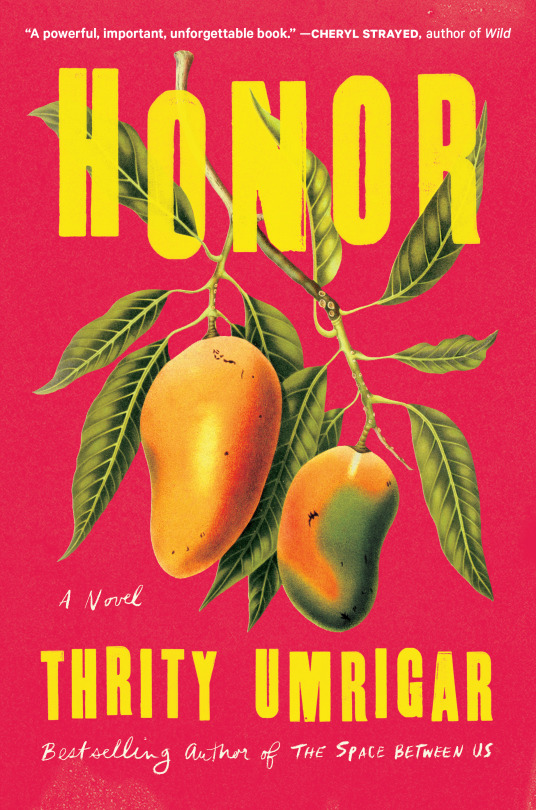


Read-Alike Friday: Moth by Melody Razak
Moth by Melody Razak
Ma and Bappu are liberal intellectuals teaching at the local university. Their fourteen year-old daughter—precocious, headstrong Alma—is soon to be married. Alma is mostly interested in the wedding shoes and in spinning wild stories for her beloved younger sister Roop, a restless child obsessed with death.
Times are bad for girls in India. The long-awaited independence from British rule is heralding a new era of hope but also of anger and distrust. Political unrest is brewing, threatening to unravel the rich tapestry of Delhi—a city where different cultures, religions and traditions have co-existed for centuries. When Partition happens and the British Raj is fractured overnight, the family is violently torn apart, and its members are forced to find increasingly desperate ways to survive.
Honor by Thrity Umrigar
Indian American journalist Smita has returned to India to cover a story, but reluctantly: long ago she and her family left the country with no intention of ever coming back. As she follows the case of Meena—a Hindu woman attacked by members of her own village and her own family for marrying a Muslim man—Smita comes face to face with a society where tradition carries more weight than one’s own heart, and a story that threatens to unearth the painful secrets of Smita’s own past. While Meena’s fate hangs in the balance, Smita tries in every way she can to right the scales. She also finds herself increasingly drawn to Mohan, an Indian man she meets while on assignment. But the dual love stories of Honor are as different as the cultures of Meena and Smita themselves: Smita realizes she has the freedom to enter into a casual affair, knowing she can decide later how much it means to her.
In this tender and evocative novel about love, hope, familial devotion, betrayal, and sacrifice, Thrity Umrigar shows us two courageous women trying to navigate how to be true to their homelands and themselves at the same time.
The Ministry of Utmost Happiness by Arundhati Roy
The Ministry of Utmost Happiness takes us on a journey of many years – the story spooling outwards from the cramped neighbourhoods of Old Delhi into the burgeoning new metropolis and beyond, to the Valley of Kashmir and the forests of Central India, where war is peace and peace is war, and where, from time to time, ‘normalcy’ is declared.
The tale begins with Anjum—who used to be Aftab—unrolling a threadbare Persian carpet in a city graveyard she calls home. We encounter the odd, unforgettable Tilo and the men who loved her—including Musa, sweetheart and ex-sweetheart, lover and ex-lover; their fates are as entwined as their arms used to be and always will be. We meet Tilo’s landlord, a former suitor, now an intelligence officer posted to Kabul. And then we meet the two Miss Jebeens: the first a child born in Srinagar and buried in its overcrowded Martyrs’ Graveyard; the second found at midnight, abandoned on a concrete sidewalk in the heart of New Delhi.
As this ravishing, deeply humane novel braids these lives together, it reinvents what a novel can do and can be. The Ministry of Utmost Happiness demonstrates on every page the miracle of Arundhati Roy’s storytelling gifts.
The Book of Everlasting Things by Aanchal Malhotra
On a January morning in 1938, Samir Vij first locks eyes with Firdaus Khan through the rows of perfume bottles in his family’s ittar shop in Lahore. Over the years that follow, the perfumer’s apprentice and calligrapher’s apprentice fall in love with their ancient crafts and with each other, dreaming of the life they will one day share. But as the struggle for Indian independence gathers force, their beloved city is ravaged by Partition. Suddenly, they find themselves on opposite sides: Samir, a Hindu, becomes Indian and Firdaus, a Muslim, becomes Pakistani, their love now forbidden. Severed from one another, Samir and Firdaus make a series of fateful decisions that will change the course of their lives forever. As their paths spiral away from each other, they must each decide how much of the past they are willing to let go, and what it will cost them.
Lush, sensuous, and deeply romantic, The Book of Everlasting Things is the story of two lovers and two nations, split apart by forces beyond their control, yet bound by love and memory. Filled with exquisite descriptions of perfume and calligraphy, spanning continents and generations, Aanchal Malhotra’s debut novel is a feast for the senses and the heart.
#historical fiction#india#readers advisory#reading recommendations#reading recs#book recommendations#book recs#library books#tbr#tbrpile#to read#booklr#book tumblr#book blog#library blog
5 notes
·
View notes